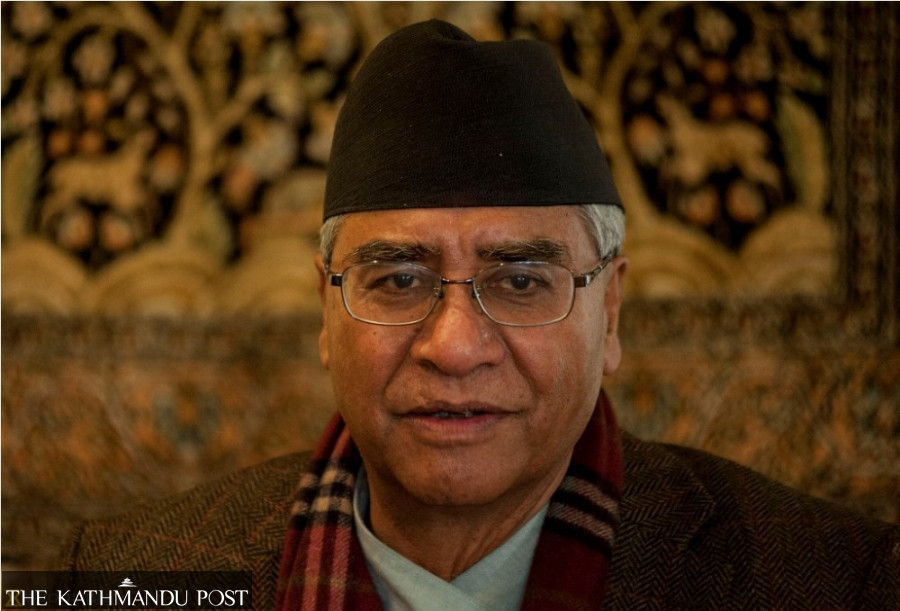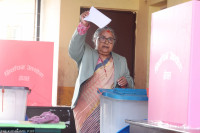Politics
As MCC becomes a lightning rod for controversy, Deuba is in a tight spot
The prime minister appears to have fallen into a trap with coalition partners’ strong reservations about the American programme, as US officials are due to arrive this week.
Tika R Pradhan & Anil Giri
On July 27, US Secretary of State Antony Blinken rang up Prime Minister Sher Bahadur Deuba and discussed a wide range of issues. The brief conversation took place hours before the US official landed in India.
The Ministry of Foreign Affairs said Deuba and Blinken spoke about US-Nepal relations, vaccine assistance and cooperation, including the Millennium Challenge Corporation.
“The prime minister thanked the United State's government for continued cooperation in the socio-economic development of Nepal,” read the statement issued by the Foreign Ministry. “The conversation also covered various areas of Nepal’s development priorities, the US cooperation and the MCC.”
The MCC is a Washington-led programme under which Nepal would receive $500 million in grants from the American government, and it was signed in 2017. Deuba was prime minister then. However, following controversy surrounding the programme, the MCC is yet to be ratified by Nepal’s Parliament, a prerequisite for its implementation in the areas of electricity transmission and transport (road) sector.
As MCC Vice President Fatema Z Sumar is set to arrive in Nepal on Thursday, the American programme has become a hot potato once again.
While the ruling Nepali Congress wants to push for its parliamentary ratification, its coalition partners, the Communist Party of Nepal (Maoist Centre) and the CPN (Unified Socialist), have some reservations.
Deuba now is seeking the support of the main opposition CPN-UML, whose chair KP Sharma Oli he replaced just a month and a half ago.
And on Friday, the Ministry of Finance sent a letter to the MCC headquarters in Washington, DC, seeking clarification.
Some concerns, however, are ludicrous, as the ministry has sought to know if the agreement is “above Nepal’s constitution” and if it “undermines Nepal’s sovereignty”, which observers say was for the grant recipient country to decide, not the donor.
The Finance Ministry is currently led by Janardan Sharma of the Maoist Centre, a party which has maintained a rigid position against the American programme. Sources at the ministry say the letter was drafted from outside the ministry, raising concerns if it was the party’s position rather than the government agency’s.
Dhani Ram Sharma, chief of the international economic cooperation coordination division at the ministry, said that the concerns raised in the letter basically reflect what a section of the public has been saying.
“It’s [sending the letter] a political decision taken at the finance minister level,” Sharma told the Post. “Discussions have been going on at the political level whether to make some amendments to the agreement or seek clarification on some issues before the MCC’s endorsement.”
Some senior bureaucrats and former diplomats have already raised questions about the kinds of concerns raised in the ministry letter, which is said to have been dispatched to the MCC headquarters via the US embassy in Kathmandu.
“We do not know who drafted the letter but it was poorly written and has totally failed to comprehend the essence of the constitution and sovereignty,” said a former diplomat. “We have never used such undiplomatic language while making correspondence to foreign nations, which reflects poorly on our own constitution and sovereignty.”
Rameshore Khanal, a former finance secretary, said he has never seen or heard about “such an undiplomatic letter” seeking guarantee of Nepal’s sovereignty from other countries.
Both the former diplomat and Khanal were of the view that it was unwise on the part of the government to include those statements in a diplomatic letter, which are being made on the streets.
A senior Finance Ministry official told the Post that the concerns related to sovereignty, national interest and whether the MCC agreement “is above the Constitution of Nepal” are not the position of the government of Nepal.
“These concerns have been raised by people from various walks of life and some sections of political parties,” said the official who spoke on condition of anonymity citing the sensitivity of the matter. “These are aimed at assuaging such people’s concerns about the American programme.”
According to the official, the ministry in the cover letter has made it clear that the concerns attached are of certain sections of the Nepali public and that they don’t reflect Nepal government’s position.
A senior Nepali Congress leader said that the letter was dispatched after Maoist Centre chair Pushpa Kamal Dahal gave the nod to those questions. Prakash Sharan Mahat, joint general secretary of the Nepali Congress, said that Prime Minister Deuba was very much in the know of the content of and questions raised in the letter.
“There was an agreement among the members of the ruling coalition,” Mahat told the Post. “I understand that the questions are meant to mollify the concerns of those opposing the US programme.”
Most of the questions raised by the Finance Ministry are what have been hotly debated in the public sphere in recent months.
Those opposed to the MCC say it is part of Washington’s Indo-Pacific Strategy, which aims to countervail Beijing’s bid to expand its influence in the region through its Belt and Road Initiative (BRI), an ambitious programme that seeks to connect Asia with Africa and Europe via land and maritime networks.
Nepal signed up to the BRI in May 2017, four months after Nepal and the US signed the MCC agreement.
Now amid confusion over the MCC, Oli, the UML chair, is taking a dig at the Congress-Maoist Centre alliance.
“The Congress and Maoists were in power when the MCC was signed. Now they are silent. Probably they want to pass it by deceiving the people,” Oli said at a party function in Kathmandu on Saturday. “Shouldn’t they speak about the MCC and tell the truth before the people? Should not Deuba speak... should not Dahal speak on this?”
Aversion to the MCC runs deep in the Maoist Centre, with its leaders making public statements against the US programme.
“How can the MCC move forward without an agreement among coalition partners?” said Leelamani Pokhrel, a Standing Committee member of the Maoist Centre. “Our party’s official position is to endorse it only after amending the provisions which undermine Nepal’s sovereignty.”
Many wonder if the Maoist Centre is weaponising the MCC against Deuba, like it did against Oli in the past, in the wake of growing consultations between Deuba and Oli of late.
The MCC bill was registered in the Parliament Secretariat by the Oli government on July 15, 2019. However, it did not move forward, as the Maoist Centre as well as some prominent leaders of the UML objected to its ratification. At that time, the UML and the Maoist Centre were united as the Nepal Communist Party (NCP). The party had even formed a committee “to study” the report and make recommendations as to what changes needed to be made to the agreement.
But the Nepal Communist Party (NCP) was invalidated in March by the Supreme Court, through an order that revived the UML and the Maoist Centre.
The Maoist Centre and the Nepal faction of the UML then played a crucial role in engineering Oli’s fall, thereby creating a situation for Deuba’s ascension to power.
Distrust, however, has already raised its head in the ruling coalition, as the Maoist Centre and CPN (Unified Socialist) are suspicious of Deuba, especially after he sent his Law Minister Gyanendra Bahadur Karki to meet with Oli on September 1.
Before meeting with Oli, Karki had held discussions with UML’s Subas Nembang on the working relationship between the government and the opposition party on a host of issues, including MCC’s parliamentary ratification.
“We talked about improving relations between the government and the opposition and the MCC too figured during the talks,” said Nembang. “I told him that we had taken the MCC to Parliament, but the Speaker did not move it forward.”
Karki told the Post that he had discussed various issues, including the MCC with the opposition, and admitted that the ministry had sent a letter to the MCC headquarters. He refused to elaborate.
Maoist Centre leaders say attempts are being made by the Congress and the UML to get the MCC through Parliament.
“It’s not that easy, but attempts are being made to bring the Congress and the UML closer to ensure that the MCC gets ratified,” said Dev Gurung, a senior Maoist Centre leader.
Newly formed CPN (Unified Socialist) is also firmly against endorsing the MCC without some amendments. According to its leaders, discussion on the MCC would start only after the US government comes up with its clarification.
“Let’s see how the US government responds to the letter,” said Beduram Bhusal, a Standing Committee member of the CPN (Unified Socialist). “Their official clarification must be a part of the agreement to convince people for its endorsement.”
With diplomatic challenges with India and China, over the disappearance of a youth in Mahakali and border disputes in Humla district, respectively, Deuba is already in for a tough time, and the MCC becoming the lightning rod comes as another headache for him.
Observers say as the row over the US aid continues to grow, the ruling coalition’s fate now hangs in the balance.
“Given such serious reservations over the MCC, the ruling alliance may not remain intact,” said Shyam Shrestha, a political analyst. “Even Upendra Yadav’s Janata Samajbadi Party, yet another partner in the Deuba government, is against the MCC ratification without some amendments. If the alliance unravels, the Maoist Centre and the CPN (Unified Socialist) will surely face a serious political setback.”
Prithvi Man Shreshta contributed reporting.




 22.7°C Kathmandu
22.7°C Kathmandu














